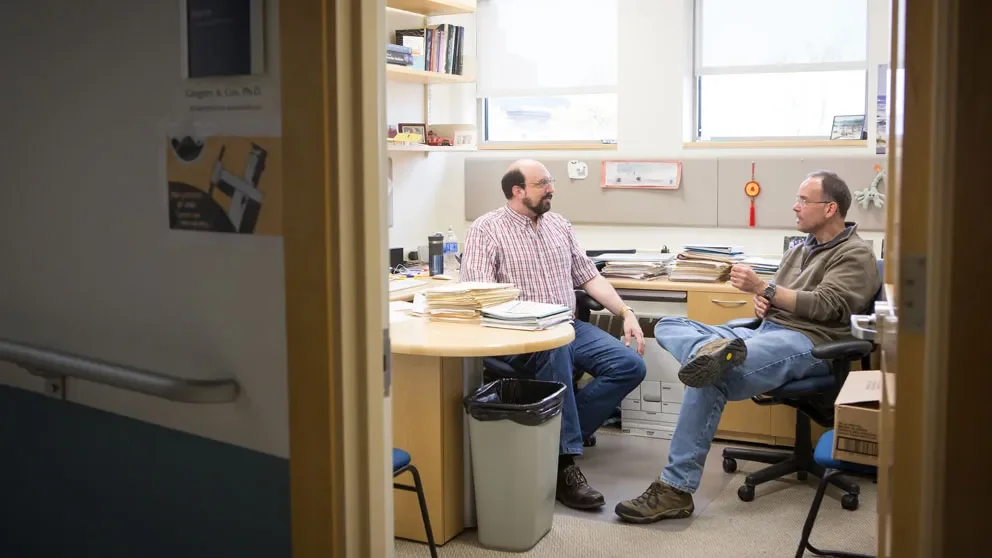Empowering medicine: team science
The Search Magazine Article | June 11, 2018
“If you had to characterize 21st-century biomedical research with just one word,” says JAX President and CEO Edison Liu, M.D., “it might well be ‘collaboration.’”
That’s because we have entered the era of complex genetics, looking at the ways in which our approximately 20,000 genes work together in health and disease. Deciphering this complexity demands that experts in genetics, medicine and biology team up with specialists in computational science, genome sequencing, imaging and a host of new technologies such as single-cell genomics and gene editing.
You could make the case that JAX is the world's most collaborative research institution.
Take Liu’s own research, which probes the genomes of breast cancer tumors in search of new treatment approaches. Besides his lab staff, Liu’s multiple research projects involve contributions by computational biologists, clinicians and other specialists and experts, at JAX and at research institutions across the U.S. and around the globe.
And, like thousands of researchers in at least 75 countries, Liu’s work depends on data and mice from The Jackson Laboratory. It was JAX that made the mouse the model of choice for biomedical research, and JAX® Mice are the most published mouse models in the world.
“You could make the case,” Liu says, “that JAX is the world’s most collaborative research institution, and consequently the world’s most significant catalyst for innovation in health and disease.”
JAX scientists are sought-after collaborators on national and international research projects, Liu says. “We are taking the lead in fostering partnerships between the bench and clinical researchers around the world that build on each discipline’s work and accelerate insights into the genetic causes of disease and the development of new treatments.”
More than 140 current research grants from the National Institutes of Health (NIH) are for multi-institutional projects that are either led by or feature JAX researchers. These projects include collaborators at Columbia University, Harvard Medical School, The Scripps Research Institute and MD Anderson Cancer Center.
In 2017 JAX Professor Derya Unutmaz, M.D., was named the principal investigator on a five-year, $10.5 million grant for the study of myalgic encephalomyelitis/chronic fatigue syndrome, a highly debilitating and poorly understood chronic disease. Under the grant, Unutmaz will collaborate with JAX colleagues and with researchers at Bateman Horne Center in Salt Lake City; the University of Connecticut; North Carolina State University; and the San Francisco-based company Precise.ly.
Also in 2017, JAX was named among nine institutions participating in a five-year, $25 million cooperative agreement from the National Center for Advancing Translational Science to improve clinical and translational research data sharing across a network of more than 50 medical research institutions. JAX Computational Biologist and Professor Peter Robinson, M.D., M. Sc., is the JAX consortium principal investigator.
These new programs join other large-scale, multidisciplinary, multi-institutional and cross-functional research centers at JAX. In recent years, the NIH has funded JAX centers for the study of Alzheimer’s disease and dementia, the genetics of addiction and precision genetics.
JAX Professor Jacques Banchereau, Ph.D., together with Liu and another dozen JAX scientists, have joined 14 scientists at The Cancer Center at Harvard Medical School’s Beth Israel Deaconess Medical Center for a pilot genomics grant program to study a variety of cancer types, including lung, breast, prostate, and brain.
An emerging Connecticut research hub
The Jackson Laboratory for Genomic Medicine’s location on the campus of the UConn Health has enabled a wide variety of thriving research partnerships and has facilitated JAX research connections with collaborators throughout Connecticut and New York.
Professor Jacques Banchereau, Ph.D., works with George Kuchel, M.D., UConn Health gerontologist and researcher on aging. Last year the two received funding from the National Institute on Aging to better understand the biological reasons for the decline of the immune system.
One of the world’s most dynamic and promising fields of research is the microbiome, the study of the trillions of microorganisms that live in and on the human body. Evnin Family Chair and Director of Microbial Genomics George Weinstock, Ph.D., joined colleagues at UConn, Yale University and the Weizmann Institute of Science in Israel to form the Metabolic Research Alliance to address the research void in diseases such as obesity and diabetes that affect billions of people worldwide.
Weinstock also launched a partnership with Wallingford, Connecticut-based Shoreline Biome to develop new ways to study the microbiome and develop new diagnostic approaches for disease-causing pathogens, and joins David Nicolau, M.D., at Hartford Hospital to study the effects of antibiotics on the microbiome.
Other JAX collaborative research projects in Connecticut include:
- Charles Lee, Ph.D., FACMG, professor and scientific director of JAX Genomic Medicine Lee is working with Mark Gerstein, Ph.D., a computer scientist at Yale School of Medicine. They are using computational and experimental approaches to discover genomic drivers of specific cancer types.
- Adam Williams, Ph.D., assistant professor Williams and Tregony Simoneau, M.D., a pediatric pulmonologist at Connecticut Children’s Medical Center, are partnering to investigate the immunological fingerprint of allergic asthma.
- Albert Cheng, Ph.D., assistant professor Cheng is one of the world’s leading experts in gene-editing technologies such as CRISPR/ Cas9, and worked with Marc Lalande, Ph.D., of UConn Health to find ways to prevent the inheritance of a very rare genetic disorder, Prader-Willi syndrome.
Nine decades of collaboration
The collaborative nature of JAX goes all the way back to its establishment in 1929 in Bar Harbor, Maine. As the institution grew from eight scientists, leadership intentionally avoided creating departments as in academic institutions. Today the JAX faculty numbers more than 70, yet they still work in an open structure free of administrative “silos.”
This results in a nimble research environment that is exceptionally conducive to inter‑lab, inter‑campus sharing of ideas and projects. “JAX is singular in so many ways,” Liu says. “Our tradition of collaboration is essential to who we are as an institution, and it also extends to the world. We are embedded in the fabric of biological discovery.”
